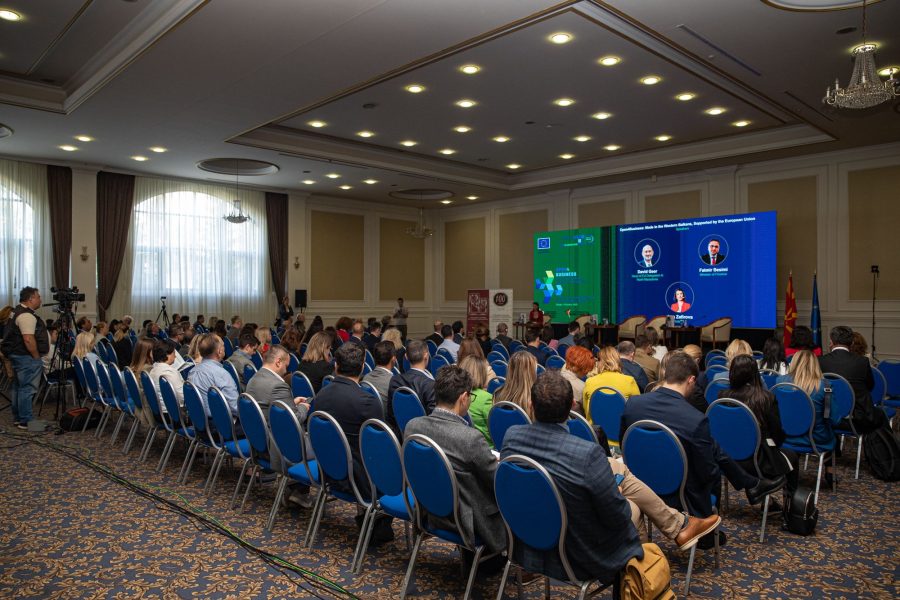
Open4Business – Made in the Western Balkans – Supported by the EU
The potentials of micro, small and medium enterprises (MSMEs) in the Western Balkans region and the EU support for their growth were in the focus of the regional hybrid event on the theme “Open4Business – Made in the Western Balkans – Supported by the EU”, organized by the European Commission Directorate General for European Neighborhood and Enlargement
Negotiations (DG NEAR), in cooperation with the Western Balkans 6 Chamber Investment Forum and the Economic Chamber of North Macedonia, on 5 October 2023.
The event gathered more than 500 participants, live in Skopje with remote connections (live streaming) to venues in the five capital cities across the region, as well as online. The event was a regional promotion of the new financial instruments of the European Union for micro, small and medium enterprises that are available in the region through the Investment Framework for the Western Balkans (WBIF) in partnership with international financial institutions. Financing will be available in the form of loans, capital, grants, guarantees, investment incentives and technical assistance, in order to obtain funds with reduced interest rates, reduced amount of collateral and increased maturity.
“SMEs have been at the canter of our support for private sector development for some time. The Economic and Investment Plan (EIP) for the Western Balkans emphasizes the importance of strengthening the competitiveness of SMEs. It calls for more investments to develop a robust, innovative, and competitive private sector… But with the Growth Plan, we set our ambition higher… We want to bring the region closer to the EU markets. We want to attract EU companies to do business and invest in the region., stated Gert Jan Koopman, Director-General, European Commission Directorate General for Neighborhood and Enlargement Negotiations in his opening remarks.
Holger Schröder, European Commission Head of Unit, Western Balkans Regional Programms – Economic Investment Plan, in his keynote address reflected on the achievements of WBIF in the Western Balkans region, stating that “the EU Contribution to the private sector since 2009 through WBIF in the region amounts to EUR 600 million, which is expected to mobilize EUR 6 billion of further investments. A focus of this assistance is on access to finance and the promotion of a more favorable financing environment for MSMEs”.
Branko Azeski, Deputy President of WB6 CIF and President of the Economic Chamber of North Macedonia emphasized the importance of having the event organized on regional level, contributing to leveraging the development gap of the region – “that is why I think that with this event we are concretely and in the right way pinpointing the two essential slogans – One region, one Economy, which is the running motto of the WB6 CIF, and Open for businesses, created in the Western Balkans, supported by the EU, which is the title of today’s event. This is the formula for our accelerated development because we must go on the road to the Single market, which is our only benchmark, as quickly as possible in order to reduce the time gap in development. It is significant to do it on a regional basis, because as small economies we realized that we cannot do anything more”, Azeski said.
Access to finance is vital for the growth of the private sector to sustain production processes and achieve development, as well as for investment, innovation, job creation and the implementation of advanced techniques and technologies. Providing affordable loans and guarantees is even more important for companies from the Western Balkans, which, compared to companies from the European Union, rely even more on financing from banks, in conditions of lower development of capital financing. However, the level of financial support measured by the degree of lending to the private sector of the banking sector as a percentage of GDP in the Western Balkans is 1.5 to 2 times lower than the European Union average. In many developed countries of the European Union, the share of private sector credits in GDP exceeds 100%, while the average share in the EU is 91.3%. In the countries of the Western Balkans region, the share of private sector loans in GDP ranges from 34% to 55.7%. The comparison between the countries of the Western Balkans and the European Union shows that there is a large space for increasing the financial support for private enterprises.
Over the past 10 years, the EU has offered more than €500 million leading to a total investment amount of €10 billion in partnership with financial institutions. This funding supported 6,500 companies and created over 100,000 jobs in the region.
Throughout the morning session, with participation of EIB, EBRD and KFW, local banks and SME beneficiaries, the positive regional experiences were shared for the available instruments for supporting the SME resilience and access to finance, boosting competitiveness of the SMEs, and financing green investments. In the afternoon session, Business to finance speed meetings were organized in Skopje, Tirana, Sarajevo, Podgorica, Pristina and Belgrade, providing SMEs tailored guidance on how to apply for the most appropriate programmes co-financed by the EU.





